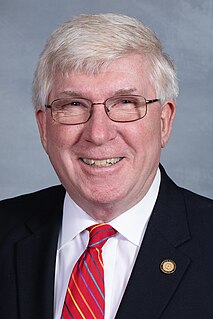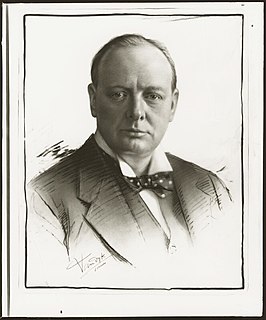
The Federal Reserve Act was passed by the 63rd United States Congress and signed into law by President Woodrow Wilson on December 23, 1913. The law created the Federal Reserve System, the central banking system of the United States.
The Great Depression in the United Kingdom, also known as the Great Slump, was a period of national economic downturn in the 1930s, which had its origins in the global Great Depression. It was Britain's largest and most profound economic depression of the 20th century. The Great Depression originated in the United States in late 1929 and quickly spread to the world. Britain did not experience the boom that had characterized the U.S., Germany, Canada and Australia in the 1920s, so its effect appeared less severe. Britain's world trade fell by half (1929–33), the output of heavy industry fell by a third, employment profits plunged in nearly all sectors. At the depth in summer 1932, registered unemployed numbered 3.5 million, and many more had only part-time employment.

The Dominion of Newfoundland was a country in eastern North America, today the modern Canadian province of Newfoundland and Labrador. It was established on 26 September 1907, and confirmed by the Balfour Declaration of 1926 and the Statute of Westminster of 1931. It included the island of Newfoundland, and Labrador on the continental mainland. Newfoundland was one of the original dominions within the meaning of the Balfour Declaration and accordingly enjoyed a constitutional status equivalent to the other dominions of the time.

Henry Chaplin, 1st Viscount Chaplin was a British landowner, racehorse owner and Conservative Party politician who sat in the House of Commons from 1868 until 1916 when he was raised to the peerage.
The Indian Statutory Commission also known as Simon Commission, was a group of seven Members of Parliament under the chairmanship of Sir John Simon. The commission arrived in British India in 1928 to study constitutional reform in Britain's largest and most important possession. One of its members was the future leader of the Labor Party Clement Attlee, who became committed to self-government for India.

Richmond Park is a parliamentary constituency in the House of Commons of the United Kingdom. Sarah Olney of the Liberal Democrats won the seat at a by-election in 2016 after Zac Goldsmith of the Conservative Party stood down in protest over expansion of Heathrow Airport. Goldsmith stood as an independent at the by-election, but the Conservative nomination was restored to him for the 2017 general election, at which he regained the seat with a slim majority. Olney won the seat from Goldsmith a second time at the 2019 general election.
Western Australian Government Railways (WAGR) was the operator of railway services in the state of Western Australia between October 1890 and June 2003. Owned by the state government, it was renamed a number of times to reflect extra responsibility for tram and ferry operations that it assumed and later relinquished. Its freight operations were privatised in December 2000 with the remaining passenger operations transferred to the Public Transport Authority in July 2003.

George John Shaw Lefevre, 1st Baron Eversley was a British Liberal Party politician. In a ministerial career that spanned thirty years, he was twice First Commissioner of Works and also served as Postmaster General and President of the Local Government Board.
The Royal Commission on the Constitution, also referred to as the Kilbrandon Commission or Kilbrandon Report, was a long-running royal commission set up by Harold Wilson's Labour government to examine the structures of the constitution of the United Kingdom and the British Islands and the government of its constituent countries, and to consider whether any changes should be made to those structures. It was started under Lord Crowther on 15 April 1969, Lord Kilbrandon took over in 1972, and it finally reported on 31 October 1973.
The Housing of the Working Classes Act 1885 was an Act of the Parliament of the United Kingdom. Sections 7 to 10 of this Act are amongst the enactments which may be cited as the Public Health Acts.
The Royal Commission on London Government, also known as the Ullswater Commission, was a Royal Commission which considered the case for amendments to the local government arrangements in the County of London and its environs. The commission was chaired by Viscount Ullswater, appointed in October 1921, and reported in 1923. The inquiry was described as an "unmitigated disaster" for proponents of reformed local government in the capital, as the commission failed to reach a unanimous decision. The majority report recommending virtually no change was signed by four commissioners, one of whom added a memorandum of dissent. Two minority reports, each signed by two commissioners, reached differing conclusions. In the event, administrative reforms were not carried out until 1965 following another inquiry.

Clare Sewell Read was a British agriculturist and Conservative politician.
The 1904 Ashburton by-election was a parliamentary by-election held in England on 7 January 1904 to elect a new Member of Parliament (MP) for the British House of Commons constituency of Ashburton in Devon. It was triggered by the death of the sitting Liberal Party MP Charles Seale-Hayne.

Richmond upon Thames London Borough Council is the local authority for the London Borough of Richmond upon Thames in Greater London, England. It is a London borough council, one of 32 in London, the United Kingdom capital. Richmond upon Thames is divided into 18 wards and elections for all Council seats in the borough are held every four years. The most recent election was in 2018 when the Liberal Democrats, led by Cllr Gareth Roberts, won control of the council.
The Royal Commission on the Depressed Condition of the Agricultural Interests was appointed by William Ewart Gladstone's Liberal government in 1894 to inquire into the depression in British agriculture. It was chaired by George Shaw-Lefevre and sat until 1897.
The Great Depression of British Agriculture occurred during the late nineteenth century and is usually dated from 1873 to 1896. Contemporaneous with the global Long Depression, Britain's agricultural depression was caused by the dramatic fall in grain prices that followed the opening up of the American prairies to cultivation in the 1870s and the advent of cheap transportation with the rise of steamships. British agriculture did not recover from this depression until after the Second World War.
Issac Fletcher was a British ironmaster and Liberal politician who sat in the House of Commons from 1868 to 1879. Fletcher committed suicide by revolver. On Thursday, 10 April 19, 1879.

Thomas Moses McInnis is an American politician. He was elected to the North Carolina State Senate in 2014. A Republican, he serves the 25th District which previously included Anson, Richmond, Scotland, Stanly and a portion of Rowan counties. Due to the redrawing of the legislative district maps in 2018, District 25 now includes Anson, Moore, Richmond and Scotland Counties.

Winston Churchill was made Chancellor of the Exchequer in 1924 by Prime Minister Stanley Baldwin and served until 1929, presenting five budgets. He was initially sceptical about advice from the Bank of England and leading economists to implement a return to the gold standard. In April 1925, however, he agreed to include the measure in his first budget. It resulted in deflation and unemployment, and was a catalyst to the miners' strike that led to the General Strike of 1926. Churchill's other policies as Chancellor included free trade, a reduction in the rate of local taxation, lowering the pension age and support for coal miners and the mining industry.
The Royal Commission on Tuberculosis (1896–98), also known as the First Royal Commission on Tuberculosis was an early investigation into the history of tuberculosis (TB). On 24 April 1890, Lees Knowles, then parliamentary secretary to Charles Ritchie, President of the Local Government Board, brought a motion before the House of Commons and was subsequently appointed to formulate the commission.